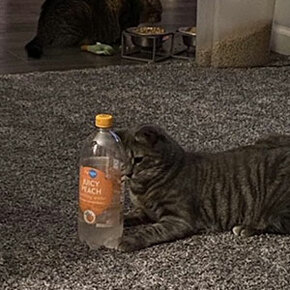
20 Unusual Laws From Around The World That You Would Never Even Think Of
Have you ever been driving and spotted a police car cooly driving the opposing way and yet that immediately sent you into anxiety mode? You’ve done nothing wrong, but you’re panicking nevertheless. While most people don’t want to get on the wrong side of the law, sometimes it happens without you being aware of it.
Certain laws change from country to country and even state to state. Some of these laws are unimaginably strange. For instance, did you know that flip-flops are illegal in Capri, Italy? Scroll down for a collection of such peculiar laws found across the world and let us know of any weird things that are illegal that you know of as well.
#1 Baby Walkers (Canada)

Image source: canada.ca
In 2004, the Canadian government banned baby walkers to protect kids since they were moving too fast, and parents or caregivers simply couldn’t respond quickly enough.
#2 High Heels In Historical Sites (Greece)

Image source: npr.org
Since 2009, Greece has outlawed wearing heels at any historical site. Apparently, the pointy heels apply too much pressure to the ground and can chip away at architectural structures.
#3 Noise (Victoria, Australia)

Image source: epa.vic.gov.au
In Victoria, Australia, residents are prohibited from making any loud noises during set hours, which are Monday to Friday before 7 am and after 8 pm. and on weekends and public holidays before 9 am and after 8 pm.
#4 Flip-Flops (Capri, Italy)

Image source: travelbiz.ie
Apparently, flip-flops are prohibited on the Italian island of Capri since they are “excessively noisy,” and residents want to enjoy their “peace and quiet.” Tourists may, however, bring “loud” shoes and wear them in the rest of Italy.
#5 Blue Jeans (North Korea)

Image source: Abhishek Bansal
Blue jeans are prohibited in North Korea because they are viewed as a symbol of American imperialism. The same applies to other Western items, such as skinny jeans, lip and nose piercings, and branded T-shirts.
#6 Running Out Of Gas In Autobahn (Germany)

Image source: schumachercargo.com
Running out of petrol is a big no-no since stopping your car on the Autobahn in Germany is also forbidden. Moreover, walking is not allowed on the Autobahn too.
#7 Lacy Underwear (Russia, Belarus, And Kazakhstan)

Image source: Ivana Kottasova
Sales of lacy underwear are prohibited in Kazakhstan, Belarus, and Russia. Garments in contact with your skin must include at least 6% cotton, according to standards approved in 2013. This was implemented due to health concerns because lace is not a skin-breathable fabric.
#8 Mullets And Ponytails (Iran)

Image source: Phil Daoust, Saeed Kamali Dehghan
In 2010, Iran outlawed mullets, ponytails, and long, gelled hair for men but allowed quiffs or floppy fringes in the style of the 1980s. Apparently, the ban included “homosexual” and “devil worshiping” hairstyles, tattoos, sunbed treatments, and plucked eyebrows for males since they are all considered against Islamic law.
#9 Eating Durian Fruit In Public (Thailand, Japan, Hong Kong, And Singapore)

Image source: thetraveltart.com
Although the durian fruit may be a favorite among many Singaporeans and visitors, the government and private sector were obliged to ban it due to its pungent stench. Due to the numerous “No Durian” signs found almost anywhere, travelers to Singapore shouldn’t anticipate seeing durian fruit on the city’s public transportation or in major public areas. Durian has also been outlawed on various forms of public transportation in Thailand, Japan, and Hong Kong.
#10 Yellow Clothing (Malaysia)

Image source: newscrab.com
As thousands of protestors in yellow t-shirts stormed the streets of Kuala Lumpur and demanded the resignation of the Prime Minister in 2016, the Malaysian government outlawed wearing yellow clothes. Since then, anyone seen wearing yellow has been subject to arrest on the grounds that they are participating in a protest.
#11 Creating Memes (Australia)

Image source: butlers.net.au
Lawfully, memes cannot be created or distributed in Australia because of the country’s strong copyright laws. “Distributing an infringing article that prejudicially affects the copyright owner” is prohibited, according to Section 132A Part 2 of the Copyright Act.
#12 The Word “Jasmine” And Jasmine Flowers (China)

Image source: en.wikipedia.org
After the 2011 Chinese pro-democracy protests, also known as the Greater Chinese Democratic Jasmine Revolution, the word “jasmine” was blocked by China Mobile and China Unicom, suggesting that one can’t use the word “jasmine” on the internet in China. According to a report in The New York Times from May 10, 2011, selling jasmine flowers at flower marketplaces had also been prohibited.
#13 Importing Ballpoint Pens (Nigeria)

Image source: trade.gov
In addition to ballpoint pens, so are prohibited all types of footwear, live or dead birds, spaghetti or noodles, carpets, and cocoa butter.
#14 Japanese Shaving Brushes (Saint Lucia)

Image source: customs.gov.lc
These innocent-looking shaving brushes are forbidden in the Caribbean island of Saint Lucia. After a scandal involving anthrax contamination in the early 1900s, the island outlawed all imports of shaving brushes made in or exported from Japan.
#15 Using More Than 25 Pennies (Canada)

Image source: cbc.ca
Since 2013, using more than 25 pennies in a single transaction has been prohibited in Canada. This was one of the laws set to place to gradually phase out coins.
#16 Import Of Pencils (Tunisia)

Image source: countryaah.com
Most nations have a standard list of prohibited things, such as weapons and explosives. Yet, some countries have stronger laws than others. For instance, pencil imports are forbidden in Tunisia. Why? Not quite sure. However, items such as crayons, baby feeders with tubes, raisins, and soap are also prohibited.
#17 Chewing Gum (Singapore)

Image source: Elle Metz
Singapore forbids the import and trading of chewing gum, except for a few varieties allowed for medicinal reasons. The country also takes prohibition very seriously; the importer might face jail time and huge fines.
#18 Goldfish In A Glass Bowl (Rome, Italy)

Image source: chron.com
Although it is legal to own goldfish in Rome, keeping them in a glass bowl is not. It is regarded as harsh since the bowl restricts their oxygen intake and could render them blind.
#19 Photos Of The President’s House (South Africa)

Image source: Salma Abdelaziz
In 2013, the South African government threatened legal action against media sites that published images of President Jacob Zuma’s home. The photo ban came after a lengthy dispute about Zuma’s house in Nkandla, KwaZulu-Natal — a massive property with a mini-football field, a gym, and helicopter pads. A controversy broke out after it was learned that more than £12 million in public funds were spent to renovate the property, leading various media sources to publish aerial pictures of it.
#20 Candy Eggs (USA)

Image source: cpsc.gov
Kinder Surprise Candy Eggs have been classified as a choking hazard since these chocolate sweets have a little toy within them. Attempts to import this Canadian sweet have resulted in people being detained in airports.


















Got wisdom to pour?
This was such an amazing post, I really enjoyed reading it and found it very informative. While going through similar topics online, I came across this Women Blazer collection and I want to share it with everyone because it is amazing.
Thanks for such an amazing Blog, hope to see more articles like this.
hotmail login
Get law assignment help in South Africa from the best law experts of assignmenthelp.co.za at: https://www.assignmenthelp.co.za/law-assignment-help
Student Life Saviour has quality experts to provide assistance in all subjects at: https://studentlifesaviour.com
Australian Assignment Help provides law assignment help in Australia at highly affordable prices at: https://australian-assignment-help.com
Get Women Blazer collection online from the best styles at JacketArtisan at: https://www.jacketartisan.com/collections/womens-leather-blazers/
I make over 13,000 a month working part-time. I listened to different humans telling me how a good deal of cash they may make online,xi91so I was determined to locate out. Well, it turned into all actual and it absolutely modified my life. Everybody must try this job now by just using
this site……… http://cashzone3.blogspot.com/
men’s leather aviator jacket adds a touch of luxury to any outfit!
hahahah check this post https://www.demilked.com/animals-caught-stuck/ s
What an unusual laws!Actually this post made remember the times when i was in university,i had an assignment about similar laws.It was quite a struggle for me,but luckilly a friend of mine reccomended me this site https://assignmentbro.com/ca/law-assignment-help .It had fresh new ideas that inspired and helped me finish it in time.sometimes i found myself out of ideas and it was hard to find the right words but luckily this site is like a second breath of inspiration and knowledge.I hope it will help you as it helped me with my essays and not only!Kudos for sharing
Seeking help to complete an intricate academic project within the due date, professional assignment help in Canada is the best solution to complete an academic paper. I was unsure about taking external writing support for my project but the support of experts has made it easier for me to solve my project excellently. The best thing about the services is the affordable pricing that anyone can easily pay. The quality of work is outstanding and according to my expectations. Thanks to the experts for providing valuable assignment help. https://www.greatassignmenthelp.com/ca/
Your blog truly impressed me; it’s commendable and captivating. Your insights are engaging I would love to see more of your work. Please continue sharing your thoughts and ideas. Thank you for inspiring us with your writing! you can also check Halloween jacket deals